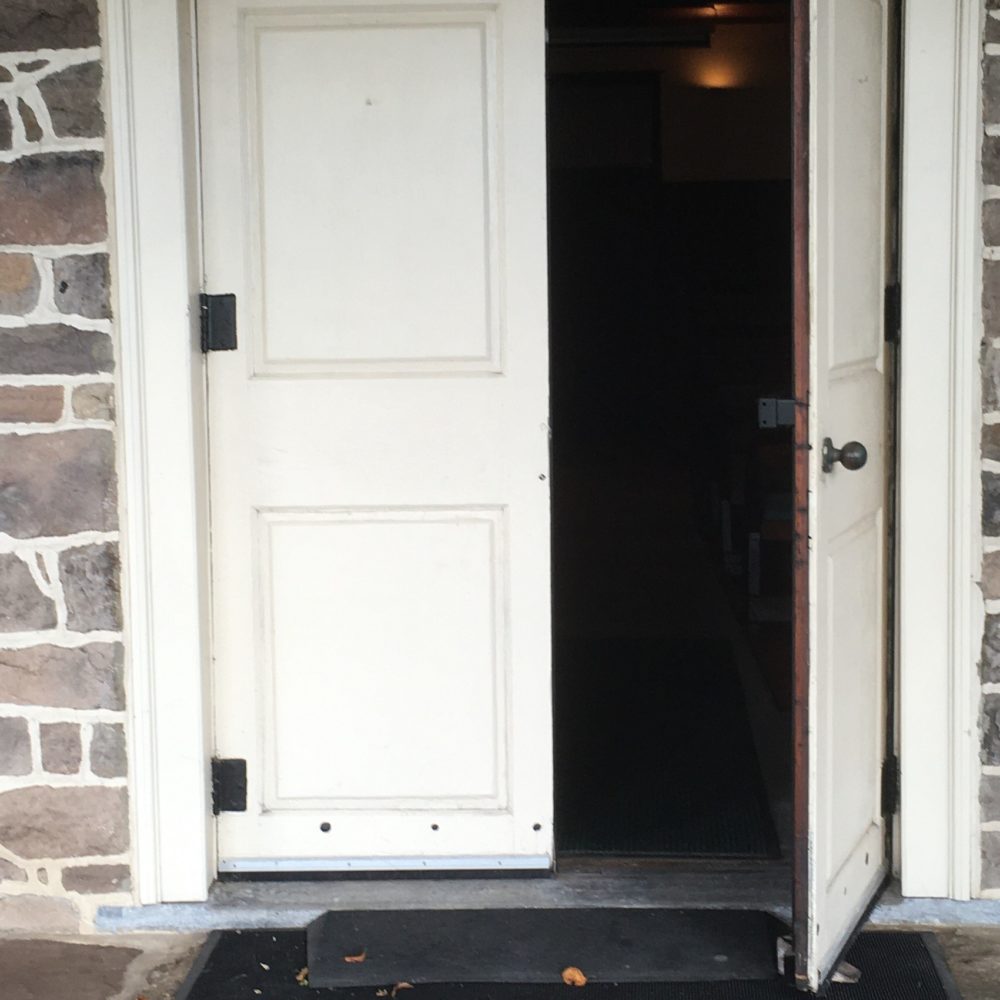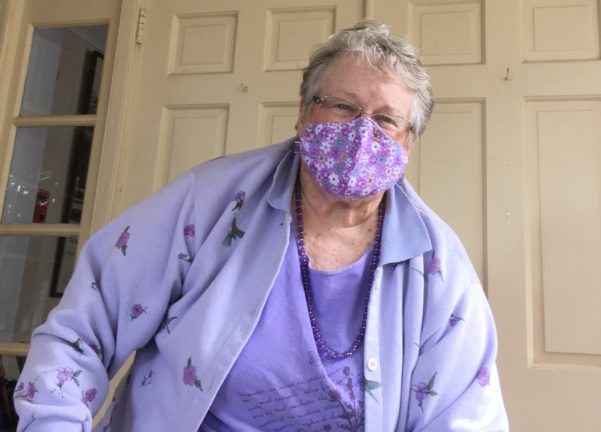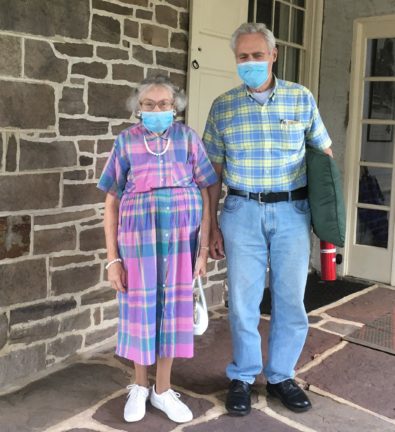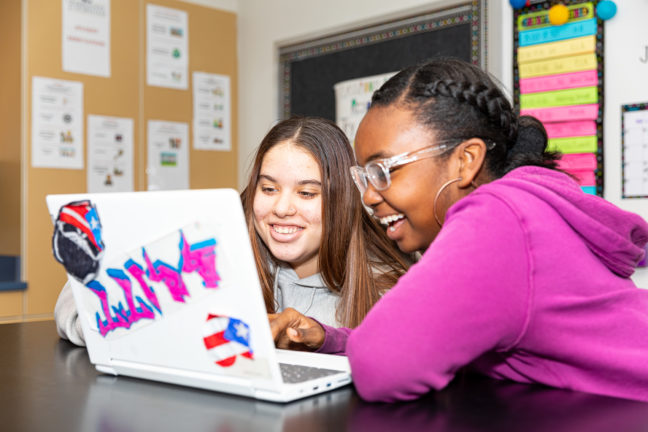
Meetings are using different approaches to cope with worship during the pandemic. This week PYM is sharing the story of Horsham Monthly Meeting and its school, The Quaker School at Horsham. Both are open, and the meeting is sharing its building with the school during the week.
After the start of the COVID outbreak, Horsham Friends joined with Upper Dublin, Byberry, and Norristown Meetings in a four-meeting Zoom worship that supported their communities during the PA shutdown. As the state reopened, they realized that with a small group of core worshipers and a large meetinghouse, conditions could be good for in-person distanced worship. Quakertown Meeting in Bucks Quarter has followed a similar model, using careful sanitizing and opening both sides of their meetinghouse. Historic Old Kennett Meeting in Bucks County, hosted in three in-person meetings for worship-once in June, July, and August implementing modifications, and mask requirements.
A group of mixed ages at Horsham—10 to 12 people—started meeting in person in mid-June, and they’ve been successfully worshiping with these restrictions: masks are worn, no more than 25 people sit a recommended distance apart, and the building is allowed to rest between uses.
They benefit from the fact that they live in a region where COVID infection rates are low, and where people are naturally distancing due to living far apart. They know that it is hard for meetings with larger communities in more urban areas to consider worship in meeting houses, and have therefore welcomed ‘Quaker worship tourists’ from other communities for Sunday worship from 10:30 – 11:15.

Arriving at the meeting house, it’s pleasant to see the doors propped open for people to just walk in. Vocal ministry through masks is definitely audible (though Horsham had a microphone on the bench just in case), and Horsham’s clerk, Betsy Lukshides, has taken to color coordinating her masks with her clothing choices each week. At the rise of meeting as people left, one couple remained to chat; Mary Ann Darlington and Frank Starrett. They were engaged, but they also said engagement was necessarily an open-ended proposition at present.
The meeting house (which replaced an earlier structure) is built on the pattern of the brick 1755 ‘Great Meeting’ now at George School, and constructed of local stone without stucco or whitewash. A writer recently called for permission to use Horsham website’s historical narrative in a local history book based on antique postcards that include Horsham Meeting.

The story is one of faith-based settlement with farms and manufacturing, with a governor’s estate thrown in for good measure.
In the early 1700s, Friends from Germantown settled, cleared land, built farms, and connected the region commercially with Philadelphia and Abington Quaker enterprises. Horsham Meeting served as the community’s spiritual, geographic, educational anchor for more than 100 years. The meeting house stands at the end of roads built to connect growing Quaker communities. Welsh Road (now route 63) came first and was laid out in 1712 to connect with mills in Gwynedd. A second road was built in 1719 to support travel from Horsham Meeting to Byberry Meeting. Route 611—the Easton Road—connected Horsham and Willow Grove meetings. Governor’s Road was also built to connect the meeting to Governor Keith’s house, Graeme Park (now a living history museum with trails).
As an example of how persistent the local Quaker influence was, Horsham meeting remained the only documented House of Worship in the township until 1884. Friends with old Quaker names (Lukens, Hallowell, Darlington) remain committed to the meeting, a long-time attender became a member at last week’s meeting for business, so there was a celebratory feel to the day.
New forms of outreach are being considered. Jesse Hallowell, an active member and a public school teacher for the school district of Philadelphia, is planning a week-long summer camp that will target local parents. The program is informed by Third Haven Meeting’s very positive experience with a similar program two summers ago, and Jesse traveled to Maryland last March to talk with Third Haven Friends and learn more about how their summer camp was implemented. Delayed by COVID this year, the meeting hopes to launch it next year.
Horsham shares the meeting house with The Quaker School at Horsham (TQS) when school is in session, so students are now worshiping in the right side of the divided meeting house (which still possesses the wooden sliding walls that made gender-separated spaces for Meetings for Business in the 1800’s).

TQS was founded as an elementary school by meeting member George Rowe, but a recent strategic plan lead to a re-envisioning of services, and a purpose-built addition for High School is now under construction. The meeting has welcomed the school into its space, and currently, twelve 9th and 10th grade students have classes there. Three administrator offices are there as well.
The complexity of these arrangements has been less of a burden for the meeting than working with the local government – which had placed severe restrictions on the Meetinghouse’s usage due to a now shuttered nearby Airforce base.
Most TQS students come to The Quaker School at Horsham because traditional schools have not served them well.
The TQS website posts a very touching list of students’ thoughts about the education they receive, the friendships they grow, and the personal grounding the school provides. It reports, “students have a mix of disabilities: ADHD, learning disabilities, autism, expressive and receptive language disorders, and anxiety disorders.”
TQS is led by Head of School, Alex Brosowsky, under a board clerked by Newtown Member Ann Reece. Horsham members Frank Jarrett and David Charles serve as members of the Board, along with Mary Beth Snyder (Newtown Meeting) and other members from the larger school and business community.
The school grounds a TQS education in the “Quaker belief that there is the Light of God within every person, and believes we are meant to share that Light through efforts, our gifts, and our actions.” The school is committed and actively involved in educational research, curriculum innovation, and bases instruction in the student’s own “inherent curiosity and desire to learn.”
More about the TQS program can be learned on the school’s well-resourced website.